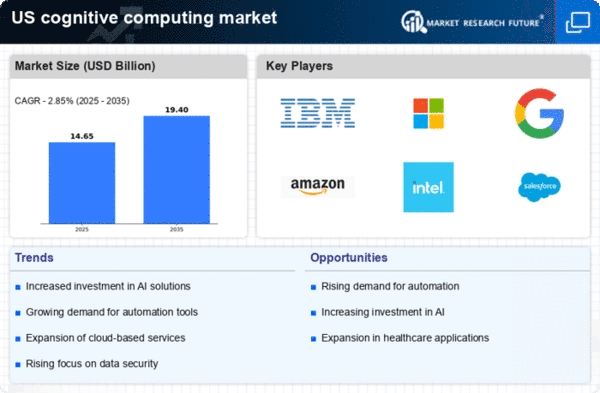Rising Demand for Automation
The cognitive computing-technology market experiences a notable surge in demand for automation across various sectors. Organizations are increasingly seeking to enhance operational efficiency and reduce human error through automated processes. This trend is particularly evident in industries such as manufacturing and finance, where cognitive computing technologies facilitate real-time data analysis and decision-making. According to recent estimates, the automation market is projected to reach $200 billion by 2026, indicating a robust growth trajectory. As businesses recognize the potential of cognitive computing to streamline operations, the market is likely to expand further, driven by the need for innovative solutions that can adapt to complex environments.
Integration of Natural Language Processing
Natural language processing (NLP) plays a crucial role in the cognitive computing-technology market, facilitating seamless human-computer interactions. The integration of NLP technologies allows systems to understand and interpret human language, making it easier for users to engage with cognitive computing solutions. This capability is particularly valuable in customer service applications, where chatbots and virtual assistants enhance user experience. The NLP market is projected to reach $35 billion by 2026, indicating a strong demand for these technologies. As organizations increasingly adopt NLP solutions, the cognitive computing-technology market is likely to benefit from enhanced user engagement and improved service delivery.
Advancements in Machine Learning Algorithms
The cognitive computing-technology market is significantly influenced by advancements in machine learning algorithms. These innovations enable systems to learn from data patterns and improve their performance over time. As machine learning techniques evolve, they empower organizations to derive actionable insights from vast datasets, enhancing decision-making processes. The market for machine learning is expected to grow at a CAGR of 40% from 2023 to 2028, reflecting the increasing reliance on these technologies. Consequently, the cognitive computing-technology market is poised for growth as businesses leverage sophisticated algorithms to gain competitive advantages and optimize their operations.
Growing Investment in Research and Development
Investment in research and development (R&D) is a key driver of growth in the cognitive computing-technology market. Companies are allocating substantial resources to innovate and develop new cognitive solutions that address emerging challenges. This focus on R&D is evident in the tech sector, where firms are striving to create cutting-edge technologies that can transform industries. In 2025, R&D spending in the technology sector is expected to exceed $200 billion, underscoring the commitment to advancing cognitive computing capabilities. As organizations prioritize innovation, the cognitive computing-technology market is likely to expand, fostering a competitive landscape that encourages continuous improvement.
Increased Focus on Personalized Customer Experiences
The cognitive computing-technology market is increasingly shaped by the demand for personalized customer experiences. Businesses are leveraging cognitive technologies to analyze consumer behavior and preferences. Businesses are leveraging cognitive technologies to analyze consumer behavior and preferences, enabling them to tailor products and services accordingly. This trend is particularly pronounced in retail and e-commerce, where personalized recommendations can significantly enhance customer satisfaction and loyalty. Research indicates that companies utilizing cognitive computing for personalization can achieve up to a 30% increase in sales. As organizations recognize the value of personalized interactions, the cognitive computing-technology market is expected to grow, driven by the need for solutions that enhance customer engagement and retention.

















